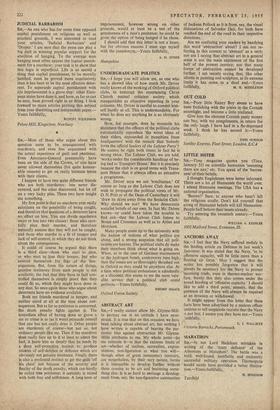SIR,—Most of those who argue about this question seem to
be unacquainted with murderers, and even less acquainted with the actual experience of guilt and penitence. Even Attorneys-General presumably have been on the side of the Crown, or else have never allowed themselves (for quite honour- able reasons) to get on really intimate terms with their clients.
I happen to have two quite different friends who are both murderers: one never dis- covered, and the other discovered, but let off on a very lucky plea. These two have taught me something.
My first point is that no murderer ever really calculates on the possibility of being caught, and therefore that questions of a deterrent have no effect on him. You can divide murderers more or less into two classes: those who care- fully plan their murder, and therefore naturally assume that they will not be caught; and those who murder in a fit of temper and lack of self-control, in which they do not think about the consequences.
It could of course be argued that there is a third class—those who start to plan, or who start to lose their temper, but who control themselves for fear of the con- sequences. But, from the nature of things, genuine testimony from such people is not available; the fact that they have in fact con- trolled themselves is simply proof that they could do so, which they might have done in any case. So once again those who argue about deterrents have no evidence available.
Both my friends murdered in temper, and neither cared at all at the time about con- sequences. But as far as penitence is concerned, the death penalty fights against it. The immediate effect of having done so grave a sin or crime is to (as it were) persuade oneself
that one has not really done it. Other people are Murderers of course—but not us, not ordinary people like me. Then if the murderer
does really face up to it at least to admit the fact, it hurts him so deeply that he tends by a deep self-protective instinct to produce reasons of self-defence or defiance which are obviously not genuine penitence, Finally there is also a profound instinct to get the guilt 'off his chest' just because of the severity and finality of the death penalty, which can hardly be called true penitence; it certainly is mixed with both fear and selfishness. A long term of imprisonment, however wrong on other grounds, would at least be a test of the genuineness of a man's penitence; he could be given the option of being hanged if he chose.
I should add that this letter is not a hoax; but for obvious reasons I must sign myself with the pseudonym,—Yours faithfully, A. N. OTHER
Hampshire










































 Previous page
Previous page